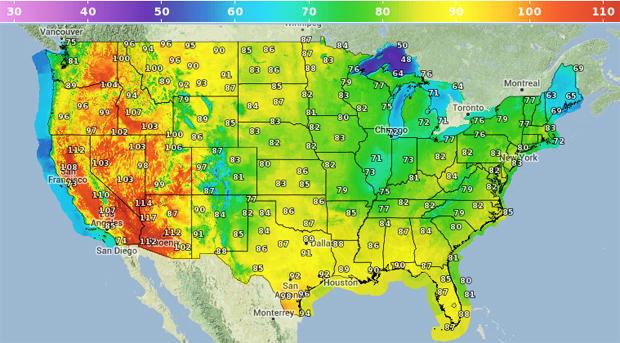Keep your pets cool during the summer weather
With temperatures skyrocketing in the West, veterinarians are urging owners to remember their pets as the heat lingers.
Pets who stay at home during hot weather should be given plenty of water and opportunities to keep themselves cool. Dr. Ann E. Hohenhaus, a staff doctor at Animal Medical Center in New York, suggested freezing an additional water bowl for your pet or leaving out some frozen treats for them to snack on.
But be cautious: Lots of treats may mean extra pounds.
"Some of these frozen deserts and treats for dogs can actually pack on calories," she warned.
If your dog or cat is on a diet but you still want them to stay cool, she suggested freezing part of their wet food or dry food supply with some water inside a toy. That way, they can enjoy the cold food without additional snacking.
There are also cooling beds, which contain chemicals or use electricity to keep the temperature down. If you crate your pet, there are little fans that you can clip onto the crate to keep the breeze blowing. But don't leave the window open without a screen: Curious animals may be keen to jump, fall and injure themselves.
Dogs that stay outdoors may be more acclimated to the hot temperature, but that doesn't mean they don't need relief from the heat. Dr. John Gicking, a board-certified specialist in critical care with BluePearl in Tampa, Fla., said it's very important that they be given plenty of water and shade where they can cool down. Hohenhaus added that there are things like cooling vests, which can be frozen in the freezer, that can be placed on animals to help keep them cooler.
While some people shave their pets during the summer, Hohenhaus said it's really a personal pet preference. Some animals actually like their fur because it helps keep them insulated and cooler. Giving them a shorter cut, though, can help owners spot ticks and fleas faster, especially during the summer when dogs are prone to roll around in the dirt.
If possible, avoid taking your dog out for a walk at the hottest part of the day.
Gicking said the reason why he sees many dogs suffering from heat-related illness during the summer is because their owners take them with them during outings. Black dogs especially can get overheated.
"You wouldn't go out today wearing a black sweater, and essentially that's what you're making your dog do," Hohenhaus said.
It's very important never to leave your dog or cat in the car, even if you think you're only going to be gone for five minutes. Temperatures can reach 110 degrees very quickly inside a closed vehicle.
"The temptation is to leave your pet in the car is because they aren't allowed in when you run to get a head of lettuce or a pint of ice cream because you're hot," Hohenhaus explained. "Before you know it, that 10 items or less line has 50 people in it."
Hohenhaus pointed out that your pooch can also get sunburned, especially on the tips of their ears, their nose or the part of their stomach that doesn't have a lot of hair. There are sunscreens specifically made for dogs that are out on the market, but be cautious not to use any products that have zinc oxide on your canine because that can damage their red blood cells.
If your pet starts to pant a lot, drool, lay down and not want to go anywhere, they may be experiencing heat exhaustion. Give them room-temperature water and bring them to a cooler place.
If you notice that your dog's gums are very red in addition to the heat exhaustion symptoms, they may be having heat stroke. Give them room-temperature water and help cool them down, and seek the advice of a veterinarian immediately.
What you don't want to do, Gicking emphasized, is put ice packs on your animal's skin. This may cause more injury than good.
"They can develop organ failure including kidney lung and liver failure, bleeding problems where they can't clot blood, and go into shock," he said.
